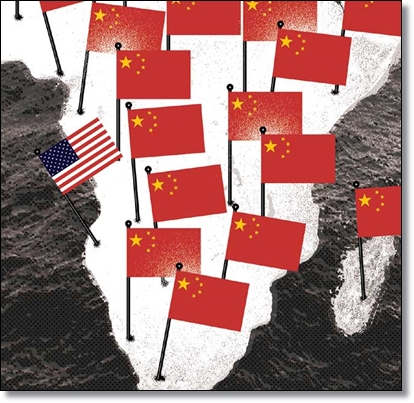US-Africa Summit: Is US Playing Catch-Up?

 |
Trying to initiate and support a dialogue between the West and Africa and at the same time experiencing the well-known Western attitude of superiority, one may wonder, whether such a dialogue will ever happen. However, the West may be forced by facts, created by the non-West, to change its attitude towards Africa.
China, Japan, India, the Gulf States, also Turkey and Russia, are doing business with African countries, partly giving aid, without preaching democracy and human rights. This is the point that GADO’ s cartoon is making: It is economic pressure and the fear of losing power, not ethics and not intercultural insight, that forces America and the West at large to shift their focus and tactics of engagement with Africa. It is a shift from political and moral demands – good governance, rule of law, accountability, democracy, human rights – to pragmatism, “from tyrants to turbines” as the Sunday Nation2 titles an article because of America’s energy programme for Africa. It is a shift from preaching the Western way of life to asking about African needs, i.e.where opportunities for business are.
The USA may not admit it, but this summit is limping behind China and others. For, since ten years China has held meetings with African leaders, has established the Forum for China- Africa Cooperation, and every year, either the Chinese prime minister or president visits African countries. What causes America’s limping may be a deep- rooted Afro – pessimism.3
Only ten years ago, Africa still was the ‘lost continent.’ In 2013, America’s trade with Africa was at $ 85 billion while China’s trade with Africa was at $ 200 billion. Thus, America has to catch up and has to perceive Africa as a ‘continent of opportunities.’ American and other Afro- pessimists may be reminded that according to the Africa Development Bank six of the world’s fastest growing economies are in Africa; Africa has experienced a decade of steady growth and the emergence of a huge middle class; a new East-African railway line will be constructed. Kenya – as an example – will build a new harbour and new oil pipelines; has issued a Eurobond that was over-subscribed by 300%; is planning a technology and business hub – the “Konza Techno City”4; and is constructing – with Chinese involvement – big roads with dimensions so far unknown in Kenya. Afro-pessimists may not have noticed that such developments are going on in Africa. American politicians try to catch up now.
But what does the economic approach to Africa mean for the continent and her people? Does it result in an economization of the society and of life in general? Does it mean, for instance, that the gap between rich and poor is widening and nobody cares because this is not the focus of a pure business approach? Are the industrialised countries themselves not suffering from an economization of their thinking and planning? The educational ideology of the OECD countries gives an example for this:PISA and the Bologna - Process are aiming at an individual that is fit for the economy and for the national economic competition. Is this – the homo oeconomicus – what African societies are supposed to import through a one-sided economic relationship with the West? Is there not a need in the West to rethink their concept of humanity?
On the other hand, the positive view of business opportunities in Africa must not forget Africa’s big problems– the conflicts, the corruption, the inefficiency in administration and business, etc. Afro-pessimists may have a point here.
However, and this is an interesting aspect, when the ‘development’ approach is replaced by a business approach– “trade, not aid” – then the responsibility of solving those internal African problems becomes an African affair. ‘Development’ is an ideological notion insofar it understands ‘development’ as the overcoming of under- development; and ‘under-development’ takes the West as the model of this ‘development.’ Therefore, when ‘aid’ is replaced by ‘trade’ then the imposed development ideology – “West is best” – can be minimized; the West does not have to feel responsible for the political and moral behaviour of Africans; the responsibility for defining their problems and solving them goes to the Africans.This also means for African societies to find and develop their way; but,based on many conditions, their way into modernity cannot be the same as the Western modernity.(See the ‘City’ as the code for an upcoming African modernity in End of Arrogance.5) GADO’s cartoon visualizes the American shift from patronizing to business, presumably compelled by different approaches by China and others. But is it a real change of attitude? Is it a shift from arrogance to respect? Is being forced not to set conditions – ‘good governance’ – a guarantee for listening and learning? Does this shift mean dialogue is no longer necessary?
By Helmut Danner
1 The East African, 9- 15 August 2014.
2 10 August 2014.
3 See Peter Kagwanja: Summit proved Africa is rising from ashes of pessimism; in: Saturday Nation, 10 August 2014.
4 See: http://www.konzacity.go.ke/ [16 Aug 2014]
5 Helmut Danner: End of Arrogance. Africa and the West – Understanding their Differences. Nairobi 2012. Also in German: Frankfurt am Main 2012.
